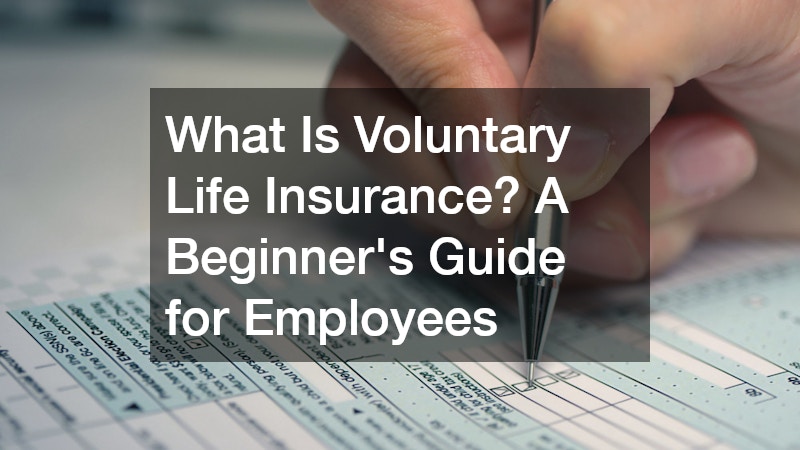
Life is unpredictable, so planning for the worst-case scenarios is one of the smartest things you can do for your loved ones. One popular option offered by many employers is voluntary life insurance. But what exactly is it, and do you really need it?
If you’ve come across this term during your company’s open enrollment or benefits meeting and felt unsure, you’re not alone. This guide breaks it down in plain language, helping you understand the basics, weigh the pros and cons, and decide if it’s the right choice for you and your family.
What is Voluntary Life Insurance?
Voluntary life insurance is a type of life insurance coverage that employees can choose to purchase through their employer, typically at group rates. Unlike employer-paid basic life insurance, which is provided automatically (and often at no cost), voluntary life insurance is optional and paid for by the employee, usually through payroll deductions.
It gives you the opportunity to buy additional coverage beyond the standard company-provided amount. In most cases, you can even choose to extend coverage to your spouse and children.
Key features include:
- Group rates: Lower premiums than individual policies.
- Payroll deduction: Easy and automatic payment setup.
- Portability: Some plans allow you to take the policy with you if you leave the job.
- Customizable coverage: You can often choose from different levels of benefit amounts.
Who Should Consider Voluntary Life Insurance?
Not everyone needs voluntary life insurance, but for many people, it offers valuable peace of mind. Here’s who might benefit most:
- Families with dependents: If others rely on your income, this extra coverage can protect their financial future.
- Those without personal policies: If you don’t already have life insurance outside of work, this is an easy way to get started.
- People seeking affordable coverage: Group policies often cost less than individual life insurance.
- Employees with financial obligations: Mortgages, car loans, and education costs can add up, and life insurance can help cover those debts in the event of your passing.
How Much Coverage Should You Get?

Choosing the right amount of coverage depends on your personal situation. Consider asking:
- How much debt would I leave behind?
- What are my family’s ongoing living expenses?
- Do I have any savings or existing life insurance?
- Would my spouse or children be financially secure without my income?
A common rule of thumb:
Many experts recommend getting life insurance coverage that equals 10–12 times your annual income. Voluntary life insurance can help you reach that target if your basic employer-provided policy falls short.
Pros and Cons of Voluntary Life Insurance
It’s important to weigh the benefits and limitations before committing to any financial product.
Pros:
- Convenience: Easy enrollment through work.
- No medical exam (up to a limit): Many plans offer guaranteed acceptance within a certain coverage amount.
- Lower premiums: Often more affordable than private individual policies.
Cons:
- Not always portable: Some plans can’t move with you if you change jobs.
- Limited customization: May not offer as many options as private policies.
- Price increases with age: Your premium might rise as you get older.
Is Life Insurance Worth It—Even Voluntary Coverage?
If you’ve ever wondered if life insurance is worth it, especially when you’re young and healthy, the short answer is: it depends on your situation. However, for most people with financial responsibilities and loved ones, yes—it’s worth the small investment to gain financial protection and peace of mind.
Voluntary life insurance serves as an affordable stepping stone for those who may not qualify for individual policies or who want to supplement what they already have.
When Should You Opt Into Voluntary Life Insurance?

You typically have the option to enroll in voluntary life insurance during your company’s annual open enrollment period, when starting a new job, or after a qualifying life event (such as marriage or the birth of a child).
You should strongly consider enrolling if:
- You’ve recently had a major life change.
- You lack sufficient life insurance coverage elsewhere.
- Your employer offers a good group rate.
- You’re concerned about affordability or medical underwriting in the private market.
Final Thoughts: Is Voluntary Life Insurance Right for You?
Voluntary life insurance can be a smart addition to your financial safety net, especially if your employer offers it at a competitive rate and you need more coverage than what’s included in your standard benefits. It’s a practical option for many, but like any financial decision, it’s important to assess your specific needs and long-term goals.
If your family would face hardship without your income, or if you’re building a financial plan for the future, voluntary life insurance could be an easy, cost-effective step in the right direction.
